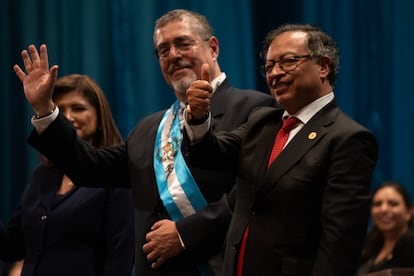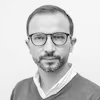Gustavo Petro scores diplomatic victory by putting Colombia’s weight behind Arévalo in Guatemala
The Colombian president left Guatemala City to an ovation after refusing to leave until the inauguration of his counterpart had gone ahead


Gustavo Petro has closed ranks in support of his Guatemalan counterpart, Bernardo Arévalo. The Colombian president’s diplomatic audacity, which on other occasions has caused friction and criticism, in this case earned him an ovation as he left the Central American country for the World Economic Forum in Davos, Switzerland. A last-ditch attempt to prevent the transfer of power in Guatemala, which eventually took place in the early hours of Monday morning, meant that some of the international guests invited to the ceremony had to leave before the swearing-in. But not Petro, who remained firm in his promise not to depart until Arévalo had taken office.
“Applause that is worth the effort. Battles that must be fought,” Petro wrote in a message accompanied by a video of the ovation on X, his favorite social network. “My personal position is the same as always; the fight for democracy from any point of view and by many paths. That is why we launched a solidarity campaign that helped in a certain way, so the destabilization that was underway would not have an effect,” he told the press in Guatemala City, where he had left open the possibility of canceling his trip to Davos if circumstances required.
Petro, the first leftist president of contemporary Colombia, is aligned with the anti-corruption stance of Arévalo and his Seed Movement. He had already clearly positioned himself a year ago, before Arévalo was even considered a contender in the August 2023 presidential elections, when Guatemala’s Attorney General’s Office unexpectedly indicted his defense minister, Iván Velásquez. “I will never accept the arrest warrant for Minister Velásquez. If Guatemala insists on jailing good men, we want nothing to do with that country,” he declared at the time. Although he called the Colombian ambassador for consultation, the insinuation of a breaking of relations with the government of Alejandro Giammattei did not materialize.
Velásquez, Petro argued at the time, was persecuted by the interests he encroached upon when he headed the International Commission Against Impunity in Guatemala (CICIG) from 2013 to 2017, which laid bare the corruption of Guatemala’s political class. From his position, sponsored by the United Nations, Velásquez dismantled dozens of corrupt structures and took on many powerful sectors. He might have stepped on many toes, but he was highly respected.
The accusation of prosecutor Rafael Curruchiche was presented as a breakthrough in the investigations into the Brazilian construction company Odebrecht. The same prosecutor, questioned in his country and labeled a corrupt actor by the United States, in December sought to annul the elections in which Arévalo was elected. The Organization of American States (OAS) considered the move an “attempted coup d’état.” Ever since the Seed Movement’s candidate won the elections, the Public Prosecutor’s Office, headed by Attorney General Consuelo Porras, has attempted to prevent the inauguration of the president-elect with the opening of several judicial processes. The international community denounced these maneuvers as an attack on democracy and supported Arévalo, but few embraced the Guatemalan cause as fervently as Petro.
Aplausos que valen la pena. Luchas que se deben dar.
— Gustavo Petro (@petrogustavo) January 15, 2024
pic.twitter.com/izwd5RgkCa
Petro’s rise to power a year and a half ago marked the path of the new Latin American left. His discourse in favor of the fight against climate change, rethinking global drug policy, or seeking total peace in Colombia provided him with international prominence at the beginning of his mandate. Later, his hyperactivity on social networks undermined Colombian diplomacy. Guatemala has allowed him to reassert himself after several misguided steps.
The Latin American left has warned of the risks of a politicized justice system, with significant differences from country to country. Denunciations of “lawfare,” proscription, or coup attempts such as the one suffered by Lula da Silva in Brazil have clouded regional politics. “Arévalo is a progressive, and Petro identifies with what progressivism has classified as the main threat against democracy — which is the legal war — and he feels that Arévalo has been a victim of lawfare,” says Mauricio Jaramillo, professor of international relations at the University of the Rosary in Bogotá.
Petro aspires to be a regional leader, Jaramillo adds, and every time a constitutional crisis arises he takes the opportunity to present himself as a defender of democracy. He did so in the case of Pedro Castillo in Peru, ousted after a clumsy self-coup attempt, but his position then provoked an avalanche of criticism and reproaches. The leading role he played in Guatemala allows him to reconfigure his image in Latin America.
Unhesitatingly putting Colombia’s weight behind the legitimacy of Arévalo’s election worked out well for Petro, says analyst Sergio Guzmán of the consulting firm Colombia Risk Analysis. “I applaud what Petro did in Guatemala, but we have to view his democratic attitudes in a broad spectrum,” he notes. “Petro will also be judged by how democratic he is at home; how much he attends to the legitimate demands of the opposition.” For the time being, Colombia’s president can chalk up a timely diplomatic achievement.
Sign up for our weekly newsletter to get more English-language news coverage from EL PAÍS USA Edition
Tu suscripción se está usando en otro dispositivo
¿Quieres añadir otro usuario a tu suscripción?
Si continúas leyendo en este dispositivo, no se podrá leer en el otro.
FlechaTu suscripción se está usando en otro dispositivo y solo puedes acceder a EL PAÍS desde un dispositivo a la vez.
Si quieres compartir tu cuenta, cambia tu suscripción a la modalidad Premium, así podrás añadir otro usuario. Cada uno accederá con su propia cuenta de email, lo que os permitirá personalizar vuestra experiencia en EL PAÍS.
¿Tienes una suscripción de empresa? Accede aquí para contratar más cuentas.
En el caso de no saber quién está usando tu cuenta, te recomendamos cambiar tu contraseña aquí.
Si decides continuar compartiendo tu cuenta, este mensaje se mostrará en tu dispositivo y en el de la otra persona que está usando tu cuenta de forma indefinida, afectando a tu experiencia de lectura. Puedes consultar aquí los términos y condiciones de la suscripción digital.








































